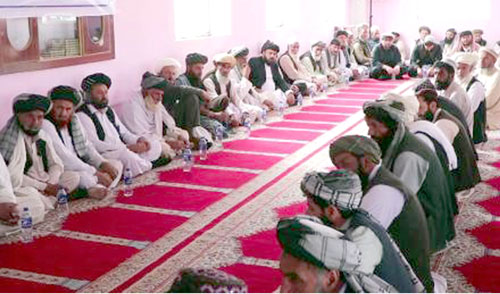Following international calls for the reopening of girls’ schools above the sixth grade, some Islamic clerics and tribal elders gathered in Gardez, the center of Paktia province, and asked the Islamic Emirate to reopen girls’ schools.
According to the clerics, girls the same as boys have the right to education.
“This is the demand of all the people of Afghanistan, education is necessary for women and men and everyone should cooperate in this regard. If it is possible, please reopen girls’ schools as soon as possible,” said Haji Musa, Islamic Cleric.
“In the Loya Jirga we were assured that the issue of education, which all Muslims are concerned about, (would be addressed),” said Mawlawi Bakhtullah, an Islamic cleric.
Meanwhile, participants urged the international community to interact with Afghanistan and release Afghan’s foreign assets.
“They should recognize the Islamic Emirate, which has the support of most of the people of the country,” said Masoom Sadat, a tribal elder.
“Based on international law, they are not allowed to give Afghanistan’s money to the victims of 9/11. I asked them to release the assets of Afghanistan,” said Mohammad Sharif, a tribal elder.
Although the Islamic Emirate has previously said that it has formed a committee to reopen girls’ schools, it is still unclear when girls’ schools above the sixth grade will open.
Meanwhile, Markus Potzel, UNAMA deputy head, at a press conference held for the human rights report released on Wednesday, expressed concern over the closure of girls’ schools and said that the education and participation of women and girls in public life is fundamental to modern society.
“Girls’ education is one issue on which UNAMA has made its views clear to the de facto authorities: participation of women and girls in all areas of society is fundamental to the development and progression of Afghanistan as a country. Relegating women and girls to their homes, depriving them of their basic human rights, deprives Afghanistan of the significant contributions they have to offer,” Potzel said.
UNAMA Chief of Human Rights Fiona Frazer read from the report, which stated that education is the key to progress and development of a nation.
“The education and participation of women and girls in public life is fundamental to any modern society. The relegation of women and girls to the home denies Afghanistan the benefit of the significant contributions they have to offer. Education for all is not only a basic human right, it is the key to progress and development of a nation,” the report reads.
Potzel, the UNAMA deputy head, added that although security has been improved since August last year, Afghan people, especially women and girls, are deprived of their human rights.
“It is beyond time for all Afghans to be able to live in peace and rebuild their lives after 20 years of armed conflict. Our monitoring reveals that despite the improved security situation since 15 August, the people of Afghanistan, in particular women and girls, are deprived of the full enjoyment of their human rights,” said Potzel.
“We ask the Islamic Emirate to open girls’ schools so that girls do not become the victims of politics,” Zarghona Ibrahimi, a student told TOLOnews.
UNAMA’s report highlights specific concerns over the Ministry of Vice and Virtue and the General Directorate of Intelligence, saying that these two institutions have restricted the fundamental freedoms of Afghans.
“Many of the directives issued by the de facto Ministry of Propagation of Virtue and Prevention of Vice limit the human rights and freedoms of Afghans, in particular women and girls. Although such directives are said to be recommendatory in nature, at times members of the de facto authorities have taken a harsh stance on their implementation, including carrying out physical punishments for alleged infringements of their directives,” UNAMA’s report reads.
Women’s rights campaigner Munisa Mobariz stated: “If they really believe in the concepts of human rights and the role of women, and that the problem of Afghan women is a sensitive and important matter for them, they should have a practical action in this regard.”
While the closing of girls’ schools above sixth grade has provoked a wide range of criticism, the deputy spokesman of the Islamic Emirate said the decision is related to the leader of the Islamic Emirate.
“The statement which has been announced by the Ministry of Education and the leadership of the Islamic Emirate, there is a clear explanation about this issue, and everyone should be satisfied with it,” said Bilal Karimi, deputy spokesman of the Islamic Emirate.
309 days have passed since girls’ schools beyond the sixth grade have been closed, but the leader of the Islamic Emirate has not mentioned the reopening of girls’ schools in his meetings and statements.—Tolonews










